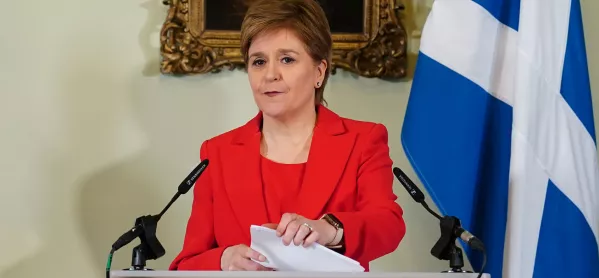What did Nicola Sturgeon say about education in her resignation speech?

Nicola Sturgeon became the first minister of Scotland just over eight years ago and today, she announced her resignation.
Ms Sturgeon was sworn into office on 20 November 2014 and by the August of the following year - in a speech at the Wester Hailes Education Centre in Edinburgh - she had effectively made education her priority by asking to be “judged” on eliminating the attainment gap.
She said: “If you’re not, as first minister, prepared to put your neck on the line over the education of our children, then what are you prepared [to do]?”
And the first minister added: “I’m not saying in five years’ time it’ll be job done - this is an ongoing process - but I want to be judged on it, and I’m going to be making sure that the information’s there to enable people to do that.”
- Background: ‘Judge me on closing the attainment gap’
- Related: Progress on closing the attainment gap ‘limited’
- Data: Literacy and numeracy figures suggest partial post-Covid recovery
- Analysis: Can Scottish Attainment Challenge ever truly ‘work’?
However, today, as she announced her intention to step down as first minister of Scotland - and reflected on some of her achievements - the attainment gap did not get a mention, except from some journalists in the room at Bute House, the first minister’s residence in Edinburgh, who had the opportunity to ask questions afterwards.
Ms Sturgeon was asked if she had any regrets that the gap remains “pretty wide” given that to close it was one of her “core missions as first minister”; she was also asked if she had failed these young people.
But she would not be drawn on the extent of the government’s progress in closing the gap - just as she steered clear of defending her record on other areas, including the state of the NHS. She only answered in general terms, that she was “a human being” and that “there’ll be things I’m hugely proud of, and things that I regret, and if I had my time I might do differently”.
Ms Sturgeon also used the questions about progress closing the attainment gap as an opportunity to talk about an achievement that she said she was proud of: the progress made in widening access to university.
When she reflected on what she had achieved over her time in office, she homed in on young people never having had “a better chance of going to university”.
The Scottish government has set itself the goal of ensuring that students from the 20 per cent most-deprived communities will represent 20 per cent of entrants to Scottish universities by 2030. The 2021 target to have 16 per cent of new entrants to full-time first-degree courses from the 20 per cent most-deprived communities was met early.
Ms Sturgeon also said she was particularly proud of the government’s investment in early years and in nearly doubling free nursery and childcare hours.
Later, she said that the effects of that policy, which was officially introduced from August 2021, “won’t be seen immediately” but that they would be “considerable” as children made their way through the school system.
But while closing the attainment gap was a topic she studiously avoided engaging with, Ms Sturgeon was clear that improving the life chances of one group of children, in particular, would remain a priority for her.
She said care-experienced young people had “got under my skin and into my heart in a way that few other issues did over my time as first minister” and that she planned to continue to champion their cause from the back benches; in the future, they would be her priority, she said, even giving them top billing just ahead of mentioning the ambition of “winning independence”, the cause she has “dedicated a lifetime to”.
“There are many issues I care deeply about and hope to champion in future,” Ms Sturgeon said. “One of these is The Promise, the national mission so close to my heart to improve the life chances of care-experienced young people, and ensure they grow up nurtured and loved.
“My commitment to these young people will be lifelong.”
And as for the Scottish government’s continuing commitment to closing the gap? That will be up to Ms Sturgeon’s successor - although, of course, funding is in place to keep the drive going during the course of the 2021-26 Parliament.
Ms Sturgeon said the SNP national executive committee would set out the timetable for the election of a new SNP leader.
John Swinney - the deputy first minister who was education secretary from 2016 to 2021 - has been suggested as a possible candidate, and was already previously SNP leader from 2000 to 2004 - as has Kate Forbes, the finance secretary.
Ms Sturgeon refused to single out her preferred candidate, saying instead the party was “awash with talented individuals” and she was looking forward to “seeing that array of talent”.
You need a Tes subscription to read this article
Subscribe now to read this article and get other subscriber-only content:
- Unlimited access to all Tes magazine content
- Exclusive subscriber-only stories
- Award-winning email newsletters
Already a subscriber? Log in
You need a subscription to read this article
Subscribe now to read this article and get other subscriber-only content, including:
- Unlimited access to all Tes magazine content
- Exclusive subscriber-only stories
- Award-winning email newsletters
topics in this article



